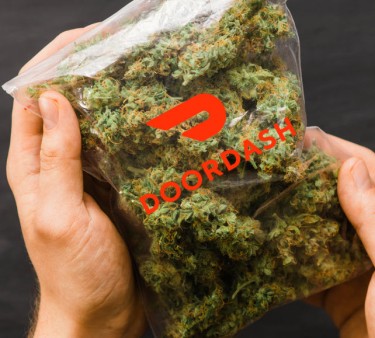Cannabis News
Guess Which Banks Now Want Cannabis Clients?
Published
1 year agoon
By
admin

Banking institutions are engaging in a competitive race to accommodate cannabis businesses in anticipation of forthcoming alterations in the federal classification of cannabis, as national data indicates. Although cannabis remains federally prohibited, a pivotal shift is on the horizon due to the U.S. Health & Human Services Department’s (HHS) recommendation to reclassify cannabis from Schedule I to Schedule III.
The National Organization for the Reform of Marijuana Laws (NORML) reports a notable surge in banking institutions actively seeking partnerships with cannabis businesses. This reflects a diminishing fear of potential repercussions.
According to quarterly data released by The Financial Crimes Enforcement Network (FinCEN), a United States Department of the Treasury division, more than 800 banks and credit unions have officially documented their affiliations with licensed cannabis enterprises with the U.S. government.
FinCEN’s latest report reveals that during the second quarter of FY2023, a historic 812 banks and credit unions have actively engaged with cannabis companies. This figure represents an unprecedented high since FinCEN began tracking such data.
This number represents a notable increase from the previous year when only 553 banks, equivalent to 11 percent of all U.S. banks, and 202 credit unions were identified as collaborating with cannabis businesses.
The report underscores that FinCEN issued guidance to clarify the expectations of the Bank Secrecy Act (BSA) for financial institutions looking to offer services to marijuana-related businesses (MRBs).
This FinCEN guidance has helped elucidate how financial institutions can deliver services to MRBs while remaining in compliance with their BSA obligations. Additionally, it ensures that the information furnished by financial institutions in BSA reports is aligned with federal and state law enforcement priorities. The complete report is available for download.
Categories of Cannabis Businesses as Identified by FinCEN
FinCEN’s 2014 Guidance outlines three classifications for describing a financial institution’s association with Marijuana-Related Businesses (MRBs) in Suspicious Activity Reports (SARs):
-
Marijuana Priority: In this classification, the financial institution provides financial services to an MRB, and its customer due diligence leads it to reasonably believe that the relationship is tied to one of the Cole Memo priorities or infringes upon state laws.
-
Marijuana Limited: This category signifies that the financial institution offers financial services to an MRB and, based on its customer due diligence, reasonably believes that this engagement does not involve any of the Cole Memo priorities or contravene state laws.
-
Marijuana Termination: This category comes into play when the financial institution deems it necessary to sever its relationship with an MRB to uphold the effectiveness of its anti-money laundering compliance program.
NORML Deputy Director Paul Armentano emphasized the critical nature of access to banks and other financial institutions for any industry’s safe, transparent, and effective operation.
He underscored that this necessity is particularly evident for players in the cannabis industry, especially smaller and minority-owned businesses, as well as the consumers they serve. He noted that these entities will continue to face significant impediments without improved access to credit and financing.
According to survey data compiled in the previous year by Whitney Economics, more than 70% of surveyed cannabis businesses identified the “lack of access to banking or investment capital” as their foremost challenge.
FinCEN’s March 2022 Marijuana Banking Update reveals a consistent upward trend in the number of banks and credit unions seeking authorization to serve cannabis businesses. According to the report, as of September 30, 2021, FinCEN received 219,097 Suspicious Activity Reports (SARs) featuring the specific phrases associated with Marijuana-Related Businesses (MRBs).
It’s worth noting that several of these SARs contain multiple key phrases, which explains why the individual figures for each keyword exceed the overall total. The report continues to elaborate on the breakdown of these SARs: FinCEN received 172,501 SARs from financial institutions using the ‘Marijuana Limited’ key phrase, 15,359 SARs from those employing ‘Marijuana Priority,’ and 42,791 SARs from institutions utilizing the ‘Marijuana Termination’ key phrase.
FinCEN initiated the provision of guidance to cannabis businesses back in 2014, aiming to assist banking institutions in navigating the challenges of operating within an environment where cannabis remains federally illegal.
What’s Prompting Banks to Change Their Stance
Yahoo! News recently covered the potential game-changing impact of the HHS recommendation to reclassify cannabis from a Schedule I to a Schedule III substance. This reclassification can reshape the cannabis industry and open up fresh prospects for banking institutions.
According to Richard Laiderman, former head of global treasury for VISA and Co-Founder and Chair of StandardC, rescheduling cannabis to Schedule III could potentially enable dispensaries to embrace credit card payments. If this shift occurs, credit card transactions may replace cash transactions, mitigating the risks and expenses associated with operating on a cash-only basis.
Robert Baron, a specialist in cannabis banking, emphasized the necessity for financial institutions seeking to engage with this industry to adopt risk management tools for assessing and overseeing cannabis businesses. He highlighted that StandardC’s business underwriting and monitoring tools are well-suited for fulfilling their obligations under the Bank Secrecy Act and customer due diligence.
The HHS recommendation to reclassify cannabis from Schedule I to Schedule III represents a historic milestone, marking the first federal-level initiative to enhance the safety of the cannabis industry for all stakeholders.
Conclusion
The evolving landscape of cannabis banking is undergoing significant transformation, driven by the potential reclassification of cannabis from Schedule I to Schedule III at the federal level. This shift holds the promise of providing newfound opportunities for financial institutions and enhancing safety, transparency, and efficiency within the cannabis industry.
As financial institutions adapt to serve this market segment, implementing robust risk management tools becomes essential to ensure compliance with regulatory requirements and foster a secure environment for all involved. The coming years will likely witness further developments and innovations in cannabis banking, marking a pivotal moment in the journey toward legitimizing and mainstreaming this burgeoning industry.
CANNABIS SET TO BE RESCHEDULED? READ ON…
Cannabis News
Daily Cannabis Use Can Help People Get Off Opioids (STUDY)
Published
2 hours agoon
March 28, 2025By
admin

Cannabis daily can help people get off opioids (STUDY)
As Donald Trump continues to trudge on in his second term, he’s made it abundantly clear that tackling the fentanyl crisis is high on his agenda. The rhetoric is bold and aggressive – promises to go after cartels with military force, threats against drug dealers, and a generally hawkish stance toward drug trafficking. It’s the kind of tough talk that plays well to his base, but the question remains: will it actually solve anything?
If we look at his appointments and policy directions, it seems we’re heading for War on Drugs 2.0 rather than an innovative approach to a complex problem. History has taught us that you can’t simply bomb, arrest, or threaten your way out of drug epidemics. These tactics have been tried for decades with little success.
There is, however, one solution hiding in plain sight that could revolutionize Trump’s approach to the opioid crisis – cannabis legalization. Yes, you read that correctly. If Trump were to take the bold step of federally legalizing cannabis, he could potentially cement his legacy as one of the most transformative presidents in modern history.
It sounds counterintuitive at first – fighting drugs with another drug? But the evidence is mounting that cannabis could be a powerful weapon against opioid addiction and overdose deaths. Recent studies are showing promising connections between cannabis use and reduced opioid dependency.
So how exactly would legalizing a plant help combat the deadliest drug crisis in American history? Well, let me tell you!
A groundbreaking study published last week in the journal Drug and Alcohol Review has added significant weight to the argument that cannabis could help combat the opioid crisis. The research, conducted by an eight-person team from the British Columbia Centre on Substance Abuse, the University of British Columbia, and Simon Fraser University, examined data from 1,242 people who used drugs while also living with chronic pain.
Their findings were striking: “Participants reporting daily cannabis use exhibited higher rates of cessation compared to less frequent users or non-users.” In other words, those who used cannabis every day were more likely to quit using opioids altogether. This effect was particularly pronounced among men, suggesting “potential differences in cannabis use behavior and effects” between sexes.
This isn’t an isolated finding. A growing body of research supports the idea that cannabis can serve as an effective substitute for opioids. A federally funded study found that in states with legal marijuana, prescriptions for opioid pain medications dropped significantly among commercially insured adults. Another study discovered that legalizing medical cannabis appeared to significantly reduce payments from opioid manufacturers to doctors specializing in pain management – further evidence that cannabis was replacing prescription painkillers.
Perhaps most compelling is the research linking cannabis legalization to reduced fatal opioid overdoses. One study estimated that recreational marijuana legalization “is associated with a decrease of approximately 3.5 deaths per 100,000 individuals.” When you consider that over 107,000 Americans died from drug overdoses in 2021 alone (with 75% involving opioids), the potential life-saving impact becomes clear.
The opioid crisis has ravaged communities across America, destroying families and costing the economy an estimated $1.5 trillion annually in healthcare costs, criminal justice expenses, and lost productivity. Cannabis legalization offers a multi-pronged solution: it provides a safer alternative for pain management, reduces dependency on opioids, and potentially saves thousands of lives each year.
Beyond addressing the opioid epidemic, legalizing cannabis would create hundreds of thousands of new jobs, generate billions in tax revenue, reduce unnecessary incarcerations (particularly in communities of color), and open up new avenues for medical research and international commerce.
For a businessman-turned-president like Trump, the economic case alone should be compelling. The question is whether he has the vision to seize this opportunity or if he’s too beholden to interests that benefit from prohibition – pharmaceutical companies, private prisons, and law enforcement agencies that rely on drug war funding. If he truly wants a slam dunk policy that would address the fentanyl crisis while creating jobs and stimulating the economy, cannabis legalization could be his legacy-defining move.
While we wait for politicians to catch up with science, those suffering from chronic pain or other conditions treatable with cannabis might consider a more immediate solution: growing your own medicine.
Now, let me be crystal clear – I’m not advocating breaking the law. If cannabis is illegal in your state, I don’t want you risking arrest and criminal charges. However, speaking personally, if I were suffering from chronic pain and had few options, I might consider a small, discreet grow operation of 2-4 plants. This would be my absolute secret – something I’d never discuss with anyone, ever.
The beauty of growing your own cannabis extends far beyond just having a supply of medicine. There’s something profoundly therapeutic about nurturing a plant from seed to harvest. You develop patience, attention to detail, and a deeper connection to the plant medicine you’re creating. It’s a relationship, not just a transaction.
When you grow your own cannabis, you also know exactly what’s in it. No pesticides, no mysterious contaminants – just pure plant medicine cultivated with care. You can select strains specifically bred for your conditions, whether that’s pain, anxiety, insomnia, or inflammation. The process puts the power of healing back in your hands.
Beyond the primary flower, home growers can make use of every part of the plant. Fan leaves can be juiced for their non-psychoactive cannabinoid content. Trim can be used to make topicals or edibles. Even the stems can be used to make teas or tinctures. Nothing goes to waste.
There’s also a significant cost advantage. A small home grow can produce enough medicine to last months, potentially saving thousands of dollars compared to dispensary prices. For those on fixed incomes or without insurance coverage for their conditions, this economic benefit can’t be overstated.
I firmly believe that any meaningful cannabis legalization bill must include provisions for home cultivation. Without the right to grow your own medicine, legalization is merely transferring authority from one controlling entity to another. It’s still authoritarianism masquerading as freedom, just with different gatekeepers.
The right to grow is fundamental to true cannabis freedom. It acknowledges the plant for what it is – a natural resource that should be accessible to all, not just those who can afford to purchase it from state-sanctioned vendors. Home cultivation empowers individuals to take control of their own health without excessive dependence on either the black market or corporate cannabis.
While we push for policy change at the federal level, let’s not forget that sometimes the most revolutionary act is simply planting a seed.
The evidence is overwhelming: we’re facing an unprecedented opioid epidemic that’s claiming thousands of American lives every year, and cannabis represents a viable, evidence-based solution to this crisis. The latest research confirming that daily cannabis use can help people quit opioids adds to the mountain of data supporting cannabis as a harm reduction tool.
Yet despite the scientific consensus, I’m not holding my breath for federal action. The sad reality is that most politicians on both sides of the aisle receive substantial funding from industries that benefit directly from cannabis prohibition – pharmaceutical companies pushing their own patented pain medications, private prison corporations dependent on drug offenders to fill beds, and police departments that receive military-grade equipment through drug war budgets.
These entrenched interests have billions of reasons to maintain the status quo, and they’ve proven remarkably effective at delaying meaningful reform for decades. Even as public opinion has shifted dramatically in favor of legalization, with roughly two-thirds of Americans now supporting it, policy changes creep along at a glacial pace.
Perhaps Trump, with his penchant for disruption and unpredictability, could surprise us all by embracing cannabis reform as part of his anti-fentanyl strategy. It would certainly align with his populist messaging and “America First” economic policies. A thriving legal cannabis industry would create jobs, boost tax revenues, and potentially save countless lives from opioid overdoses.
I can hope for such bold leadership, but I’ll continue preparing for the long, slow grind of incremental progress. In the meantime, the opioid crisis rages on, claiming lives that could potentially be saved with a plant that’s been used medicinally for thousands of years. If that’s not a tragedy of policy failure, I don’t know what is.
CANNABIS TO REDUCE OPIOID USE, READ ON…
DR. OZ SAYS CANNABIS CAN GET PEOPLE OFF OPIOIDS, HOW DOES IT WORK?
Cannabis News
Can You Order Cannabis through DoorDash?
Published
1 day agoon
March 27, 2025By
admin

DoorDash Expands Delivery Services to Cannabis (Hemp) Home Delivery: A New Era in Convenience
In a groundbreaking move, DoorDash, one of the leading food delivery companies in the United States, has announced its expansion into cannabis home delivery. This strategic decision marks a significant shift in the company’s business model, as it ventures beyond its traditional offerings of food and groceries to tap into the rapidly growing cannabis market. The move is part of DoorDash’s broader strategy to diversify its services, following successful forays into alcohol and grocery delivery.
The Rise of Cannabis and CBD Products
Over the past decade, there has been a remarkable shift in public perception and legal frameworks surrounding cannabis and CBD products. As more states legalize marijuana for medical and recreational use, the demand for cannabis-related products has skyrocketed. This trend is not limited to traditional cannabis products; hemp-derived CBD and THC products have also gained popularity due to their perceived health benefits and legal availability in many states.
The cannabis Industry’s growth is driven by consumer interest in wellness and relaxation products. CBD, in particular, has become a staple in many health-conscious consumers’ routines, with products ranging from oils and gummies to beverages and skincare. As the market expands, companies are looking for innovative ways to reach consumers, and delivery services are becoming increasingly important.
DoorDash’s Entry into Cannabis Delivery
DoorDash’s decision to enter the cannabis delivery market is a strategic move to capitalize on this trend. The company has built a robust infrastructure over the years, with a vast network of Dashers (delivery personnel) and partnerships with local businesses. By leveraging this existing infrastructure, DoorDash aims to provide a seamless and convenient experience for customers looking to purchase cannabis products from the comfort of their homes.
Key Features of the Service
-
Products Available: DoorDash will initially focus on delivering hemp-derived THC and CBD products. These include a variety of gummies, beverages, and other consumables that comply with federal regulations, containing no more than 0.3% Delta-9 THC by dry weight. This ensures that the products are legal across the country, allowing DoorDash to operate in multiple states without violating federal laws.
-
Partnerships: To facilitate these deliveries, DoorDash has partnered with several merchants. DashMart, a convenience store concept operated by DoorDash, will be a key partner, offering a range of cannabis products. Additionally, partnerships with retailers like Total Wine & More and ABC Fine Wine & Spirits will further expand the product offerings. DoorDash has also collaborated with Cann, a leading hemp-infused social beverage company, to provide customers with a diverse selection of cannabis-infused drinks.
-
Availability: Initially, the cannabis delivery service will be available in select states, including Georgia, Kentucky, Iowa, Louisiana, and Tennessee. These states were chosen based on their regulatory environments and market demand. DoorDash plans to expand its services to other states as local regulations evolve and market conditions become more favorable.
Safety and Compliance Measures
Ensuring safety and compliance is paramount for DoorDash as it ventures into cannabis delivery. The company has implemented robust measures to prevent underage access to these products, mirroring the protocols used for alcohol deliveries.
-
Age Verification: Customers must undergo electronic ID checks to verify their age. This process ensures that only adults aged 21 and older can purchase cannabis products through DoorDash.
-
Dasher Eligibility: Only Dashers who are at least 21 years old are eligible to fulfill cannabis delivery orders. This ensures that all deliveries are handled responsibly and in compliance with legal requirements.
-
Secure Packaging: Products are securely packaged to prevent tampering and ensure they reach customers safely.
Market Implications
DoorDash’s entry into the cannabis delivery market has significant implications for both the company and the broader cannabis industry.
Competitive Advantage
By expanding into cannabis delivery, DoorDash gains a competitive advantage in the delivery services market. It positions itself as a leader in convenience and innovation, appealing to a growing demographic interested in cannabis products. This move also allows DoorDash to diversify its revenue streams, reducing dependence on traditional food delivery services.
Market Growth Potential
The cannabis market is projected to continue growing as more states legalize marijuana and consumer interest in CBD products increases. DoorDash’s early entry into this market gives it a first-mover advantage, allowing it to establish strong partnerships and build brand recognition before competitors follow suit.
Regulatory Challenges
While DoorDash’s initial focus on hemp-derived products avoids federal legal issues, the company must navigate complex state-by-state regulations. As the legal landscape evolves, DoorDash will need to adapt its services to comply with changing laws and regulations. This could involve expanding into states with recreational marijuana laws or adjusting product offerings based on local restrictions.
Impact on the Cannabis Industry
DoorDash’s involvement in cannabis delivery is likely to have a profound impact on the cannabis industry as a whole.
By providing home delivery services, DoorDash increases accessibility to cannabis products for consumers. This is particularly beneficial for those who may have difficulty accessing physical dispensaries due to location or mobility issues. Increased accessibility can drive market growth by expanding the customer base.
For cannabis brands, partnering with DoorDash offers an opportunity to increase visibility and reach a wider audience. DoorDash’s platform provides a trusted and familiar interface for consumers, which can enhance brand credibility and appeal.
As DoorDash enters the cannabis delivery space, it will likely spur competition among existing delivery services and dispensaries. This competition can drive innovation, leading to better services, more competitive pricing, and a wider range of products available to consumers.
Challenges and Opportunities
While DoorDash’s move into cannabis delivery presents numerous opportunities, it also comes with challenges.
The cannabis industry is heavily regulated, and laws vary significantly from state to state. DoorDash must navigate these complexities to ensure compliance and avoid legal issues. As regulations evolve, the company will need to be agile in adapting its services.
Despite growing acceptance of cannabis, there remains a stigma associated with its use. DoorDash may face challenges in changing public perception and ensuring that its brand is not negatively impacted by its involvement in cannabis delivery.
To provide a seamless delivery experience, DoorDash will need to integrate its technology with that of cannabis retailers. This includes ensuring accurate inventory management, efficient order processing, and secure payment systems.
Future Prospects
As DoorDash expands its cannabis delivery services, the company is well-positioned for future growth. Several factors suggest that this move will be successful:
1. Growing Demand: The demand for cannabis and CBD products is increasing, driven by consumer interest in wellness and relaxation.
2. Regulatory Evolution: As more states legalize marijuana, the regulatory environment is likely to become more favorable for cannabis delivery services.
3. Technological Advancements: Improvements in technology will enhance the delivery experience, making it more efficient and secure.
Conclusion
DoorDash’s decision to expand its delivery services to cannabis products marks a significant milestone in the company’s history. By leveraging its existing infrastructure and partnering with key players in the cannabis industry, DoorDash is poised to capitalize on the growing demand for cannabis and CBD products. As the legal landscape continues to evolve, DoorDash is well-positioned to adapt and expand its offerings, potentially paving the way for broader cannabis delivery services in the future.
This move not only reflects DoorDash’s commitment to innovation and customer convenience but also highlights the company’s strategic vision for growth and diversification. As the cannabis industry continues to grow, DoorDash’s early entry into this market positions it as a leader in the delivery sector, setting the stage for a new era in convenience and accessibility for cannabis consumers.
DOORDASH FOR MUNCHIES AND WEED, READ ON…
Cannabis News
Safe Cannabis Consumption During Wildfire Season
Published
2 days agoon
March 26, 2025By
admin

Wildfire season can be challenging, particularly if you regularly enjoy cannabis. Though you might enjoy lighting up, smoky skies mean you should rethink your consumption. Given poor outside air quality, lung protection becomes especially crucial. Fortunately, there are easy, safer approaches to enjoying cannabis without aggravating your lungs more than necessary. Make sure you’re ready for easy breathing all season.
Understanding Wildfire Smoke and Its Health Risks
Not only is wildfire smoke unpleasant, but it also compromises your health—especially that of your lungs. Small particles known as PM2.5 abound in smoke from wildfires. These small toxins readily get deep into your lungs and aggravate inflammation, irritation, and dyspnoea. Breathing in wildfire smoke can aggravate allergies, asthma, or respiratory problems you already have.
Though generally healthy, constant exposure to smoky air can cause coughing, sore throats, headaches, and tiredness. Since cannabis users already expose their lungs to irritants, wildfire smoke can exacerbate that discomfort. Choosing cannabis consumption techniques free of extra smoke helps you protect your lungs during the wildfire season.
Harmful gases, including carbon monoxide and volatile organic compounds (VOCs), abound in wildfire smoke as well. These substances affect your general health by entering your bloodstream and lowering the oxygen supply to important organs. Constant exposure can compromise your immune system, impairing your body’s ability to combat diseases. Being proactive in your defense against wildfires will help avoid major long-term medical problems.
Safer Cannabis Consumption Methods During Wildfire Season
During wildfire season, you really should vary your cannabis regimen. Here’s how you can still enjoy cannabis responsibly even with smoky skies:
Opt for Smoke-Free Alternatives
Edibles are the ideal option in wildfire season. They give all the advantages and leisure of cannabis without requiring smoke inhalation. Edibles abound in several forms:
-
Gummies
-
Chocolate bars
-
Cookies
-
Beverages
If you have never used edibles, start with a low dose. Edibles take more time to start, usually up to an hour or more, thus be patient to prevent inadvertently overconsuming.
Another great smoke-free substitute is tinctures. To quickly absorb a measured dosage, just drop it under your tongue. Additionally providing exact dosages free of smoke are capsules and oils. Selecting these choices lets you keep enjoying your cannabis experience without sacrificing lung health.
Without having any effect on your respiratory system whatsoever, topicals and creams can also help with muscle aches or inflammation. Perfect during wildfire season, these products let you benefit from cannabis without consumption or inhalation.
The demand for these smokeless options is probably higher at your local cannabis dispensary on high-smoke days. During times of low air quality, many budtenders are ready to direct patrons toward lung-friendly options.
Vaporisation: A Better (But Not Perfect) Alternative
Particularly in wildfire season, vaporising can be safer than smoking if you still want to inhale cannabis. Vaporizers heat cannabis just enough to release cannabinoids without generating dangerous smoke particles. Although not entirely risk-free, vaping greatly lessens harmful irritants compared to more conventional smoking practices.
Still, vaping can aggravate some lungs, especially when wildfire smoke already influences air quality. If vaping is your preferred approach, select premium cannabis concentrates from a reputable cannabis dispensary to reduce contaminants and guarantee you’re breathing the purest vapour available.
Devices with temperature control might help you improve your vaping experience. Lower temperatures provide a safer and smoother inhale by reducing irritant creation. Maintaining a clean vaporiser also guarantees fewer pollutants are breathed in, shielding your respiratory system.
Tips for Those Who Still Choose to Smoke or Vape
Despite the extra risks during wildfire season, some cannabis users strongly prefer traditional smoking methods. These safety measures can lessen the effect on your lungs.
Stay Indoors with Air Purifiers
-
Staying indoors helps you avoid breathing wildfire smoke.
-
If smoking cannabis at home, consider running an air purifier with a HEPA filter. These filters collect small harmful particles, maintaining safer and cleaner indoor air.
-
Regularly replace or clean air purifier filters to guarantee best performance.
-
Creating a “clean room” with sealed windows and a powerful air purifier offers another layer of protection.
Use a High-Quality Filter or Respirator Mask
-
If smoking outside, wear an N95 mask afterwards to reduce inhalation of wildfire smoke particles.
-
Masks cannot completely remove all hazards but greatly lower your exposure.
-
Choose masks tagged “N95” or “KN95” for maximum protection. These masks offer superior protection compared to cloth or surgical masks.
Hydrate & Support Lung Health
Taking care of your lungs during wildfire season transcends simple smoke avoidance:
-
Stay hydrated by drinking plenty of water to maintain good lung function.
-
Herbal teas, such as ginger or peppermint, help clear mucus accumulation and reduce inflammation.
-
Use a humidifier indoors to moisten airways and ease coughing or irritation.
-
Frequent deep-breathing exercises improve lung capacity and general respiratory condition.
-
Consider natural supplements like omega-3 fatty acids and vitamin C to reduce inflammation and strengthen immunity.
-
Indoor plants like peace lilies or snake plants naturally help clean indoor air, enhancing your environment during wildfire season.
Conclusion
While it’s not necessary to give up cannabis entirely during wildfire season, it’s certainly a time to reconsider your consumption methods.
Selecting smoke-free products, including capsules, tinctures, edibles, or topicals, enables you to enjoy cannabis without compromising lung health. If you choose to smoke, ensure you pick quality products, use temperature-regulated devices, and keep cleanliness to reduce your risks.
When the air quality is bad, keep in mind that the employees at your local cannabis dispensary can be a great help. Depending on the circumstances at hand and your individual requirements, they can suggest suitable goods and ways of consumption.
Remember also to keep hydrated, buy an air purifier, support your lungs with herbal teas, supplements, and indoor plants, and never hesitate to wear masks outside.
In addition to safeguarding your immediate comfort during wildfire season, you’re also making an investment in your long-term respiratory health by choosing wisely how, when, and where to consume cannabis. It’s worth it to give your lungs extra attention during difficult air quality conditions because they work hard for you every day.
CANNABIS AND THE CALIFORNIA WILDFIRES, READ ON…

420 in Texas is at Reggie & Dro

Daily Cannabis Use Can Help People Get Off Opioids (STUDY)

This Wine Issue Is Becoming More Common

Get more for less this 420 at PurLife

Can You Order Cannabis through DoorDash?

Cannabis Enthusiast-Friendy Retreats – GanjaVacations Jamaica

The road ahead for cannabis lending in 2025

Cannara Biotech Announces Appointment of Justin Cohen to Board of Directors

Can Marijuana Help Cholesterol – The Fresh Toast

Safe Cannabis Consumption During Wildfire Season

Distressed Cannabis Business Takeaways – Canna Law Blog™

United States: Alex Malyshev And Melinda Fellner Discuss The Intersection Of Tax And Cannabis In New Video Series – Part VI: Licensing (Video)

What you Need to Know

Drug Testing for Marijuana – The Joint Blog

NCIA Write About Their Equity Scholarship Program

It has been a wild news week – here’s how CBD and weed can help you relax

Cannabis, alcohol firm SNDL loses CA$372.4 million in 2022

A new April 20 cannabis contest includes a $40,000 purse

Your Go-To Source for Cannabis Logos and Designs

UArizona launches online cannabis compliance online course
Trending
-

 Cannabis News2 years ago
Cannabis News2 years agoDistressed Cannabis Business Takeaways – Canna Law Blog™
-

 One-Hit Wonders2 years ago
One-Hit Wonders2 years agoUnited States: Alex Malyshev And Melinda Fellner Discuss The Intersection Of Tax And Cannabis In New Video Series – Part VI: Licensing (Video)
-

 Cannabis 1012 years ago
Cannabis 1012 years agoWhat you Need to Know
-

 drug testing1 year ago
drug testing1 year agoDrug Testing for Marijuana – The Joint Blog
-

 Education2 years ago
Education2 years agoNCIA Write About Their Equity Scholarship Program
-

 Cannabis2 years ago
Cannabis2 years agoIt has been a wild news week – here’s how CBD and weed can help you relax
-

 Marijuana Business Daily2 years ago
Marijuana Business Daily2 years agoCannabis, alcohol firm SNDL loses CA$372.4 million in 2022
-

 California2 years ago
California2 years agoA new April 20 cannabis contest includes a $40,000 purse













